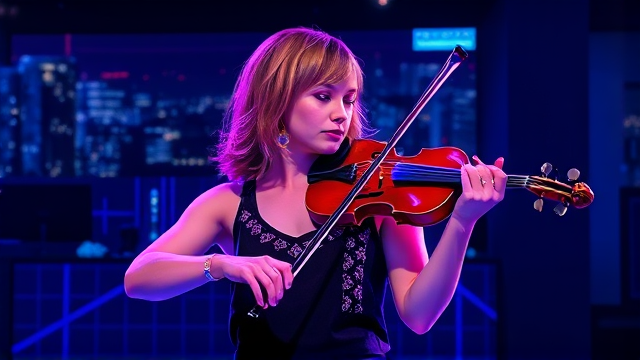Hayley Williams Gives Intense Performance on Fallon.
The air on 'The Tonight Show' shifted palpably, charged with a rare and raw voltage, as Hayley Williams, the flame-haired architect of Paramore's pop-punk anthems, delivered a performance that was less a late-night television spot and more a seismic event, a soul-baring exorcism set to an orchestral swell. Leaning into the profound intensity of her solo material from the 'Flowers for Vandalism' sessions, Williams didn't merely sing; she channeled, her voice a vessel for a century of pent-up musical anguish, transforming the brightly lit studio into a confessional booth for a nation.The arrangement itself was a masterstroke of dramatic tension, eschewing the expected guitar-driven crash for a sweeping, cinematic orchestra that wrapped around her vocals like velvet chains, each string section pulling tighter, underscoring the lyrical turmoil with a classical gravity that felt both timeless and urgently contemporary. And then, the reference that elevated the performance from mere spectacle to historic statement: a deliberate, gut-wrenching interpolation of Nina Simone’s blistering civil rights anthem, 'Mississippi Goddamn.' This wasn't a casual homage or a trendy sample; it was a direct lineage, a passing of the torch from one fierce, unapologetic woman to another, linking Williams’ personal, internal struggles with the systemic, external injustices Simone weaponized her art against in the 1960s. To understand the weight of this moment is to trace the journey of an artist who exploded from the Warped Tour circuit as a teen phenomenon, her voice a beacon for the disaffected youth of the 2000s, only to navigate the brutal machinery of fame, public scrutiny, and the suffocating expectations of a genre she helped define.Her solo work, particularly the 'Petals for Armor' and subsequent projects, has been a public diary of this reckoning—a exploration of therapy, femininity, and healing that has consistently deepened her artistic palette. This performance on Fallon was the logical, breathtaking culmination of that journey, a declaration that her canvas is now as vast as her pain and her resolve.The choice of 'Mississippi Goddamn' is especially resonant; Simone’s song was born from unspeakable tragedy—the 1963 assassination of Medgar Evers and the Birmingham church bombing that killed four young girls—and its sardonic, furious energy was so potent it was banned across several Southern states. By weaving its DNA into her own composition, Williams isn't just adding a layer of cool credibility; she is situating her own narrative of personal survival within the larger, ongoing fight for dignity and justice, suggesting that the personal is indeed inescapably political.The orchestration, likely arranged with a meticulous ear for dynamics, would have built from a somber, almost funereal opening, allowing Williams’ voice, now possessing a weathered, smoky richness far removed from the bratty exuberance of 'Misery Business,' to sit naked in the mix before the strings surged, mimicking the rising tide of emotion. One can imagine the camera cutting to a stunned Jimmy Fallon, his usual affable grin replaced by genuine, unvarnished awe, the live audience holding a collective breath, realizing they are witnessing not just entertainment, but a piece of art being forged in real time.This performance will be dissected for days on music blogs and social media, not for its viral potential, but for its substantive heft. It raises compelling questions about the evolving role of the pop-punk icon in 2024, the boundaries of genre, and the capacity for mainstream platforms to host genuinely challenging, transformative work.It echoes similar moments of televised transcendence—think Adele’s 'Hello' on 'The BBC' or Beyoncé’s 'Lemonade' visual album—where an artist’s personal evolution aligns perfectly with a cultural moment, creating a before and an after. For Williams, this was a definitive shedding of any remaining commercial skin, a powerful testament to an artist in complete command of her narrative, using her massive platform not for easy nostalgia, but for a complex, uncomfortable, and ultimately beautiful conversation that bridges the gap between the ache in one's chest and the roar of a movement. It was, in short, a performance that will be remembered not for what it was, but for what it demanded of everyone who witnessed it: to listen, and to feel, more deeply.
Latest News
In the grand, unpredictable symphony of popular music, a song's legacy is never just about the notes on the page or the voice in the recording; it's about the
31 minutes ago0 comments
The air in Kobe’s Glion Arena crackled with a rare, almost archival energy on that October night, a feeling that transcends the usual stadium roar—this wasn't
41 minutes ago0 comments
In a move that echoes the delicate diplomatic choreography more commonly seen in United Nations assemblies than in song contests, the European Broadcasting
4 hours ago0 comments
The venerable halls of Christie's, a temple to art and antiquity where whispers of gavels have consecrated the exchange of cultural totems for generations,
5 hours ago1 comments
The needle hasn't just moved; it has been ripped from the groove and cast in solid gold.
7 hours ago0 comments
In the grand, often predictable theater of pop music releases, where artists frequently trade artistic ambition for algorithmic certainty, Louis Tomlinson’s
7 hours ago1 comments
Let’s get one thing straight right off the bat, darlings—no, these gummies do not actually contain cornbread, which, let’s be honest, would be a truly wild
7 hours ago0 comments
In a move that sent the gossip-sphere into a full-blown frenzy, Georgina Badell recently took to her social media channels, not to address the swirling rumors
8 hours ago2 comments
It’s quiet here...Start the conversation by leaving the first comment.
